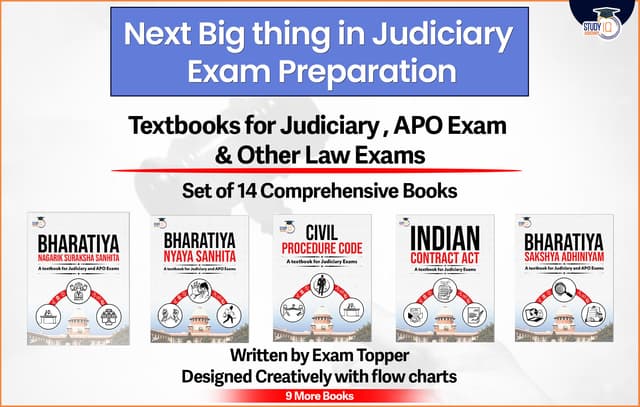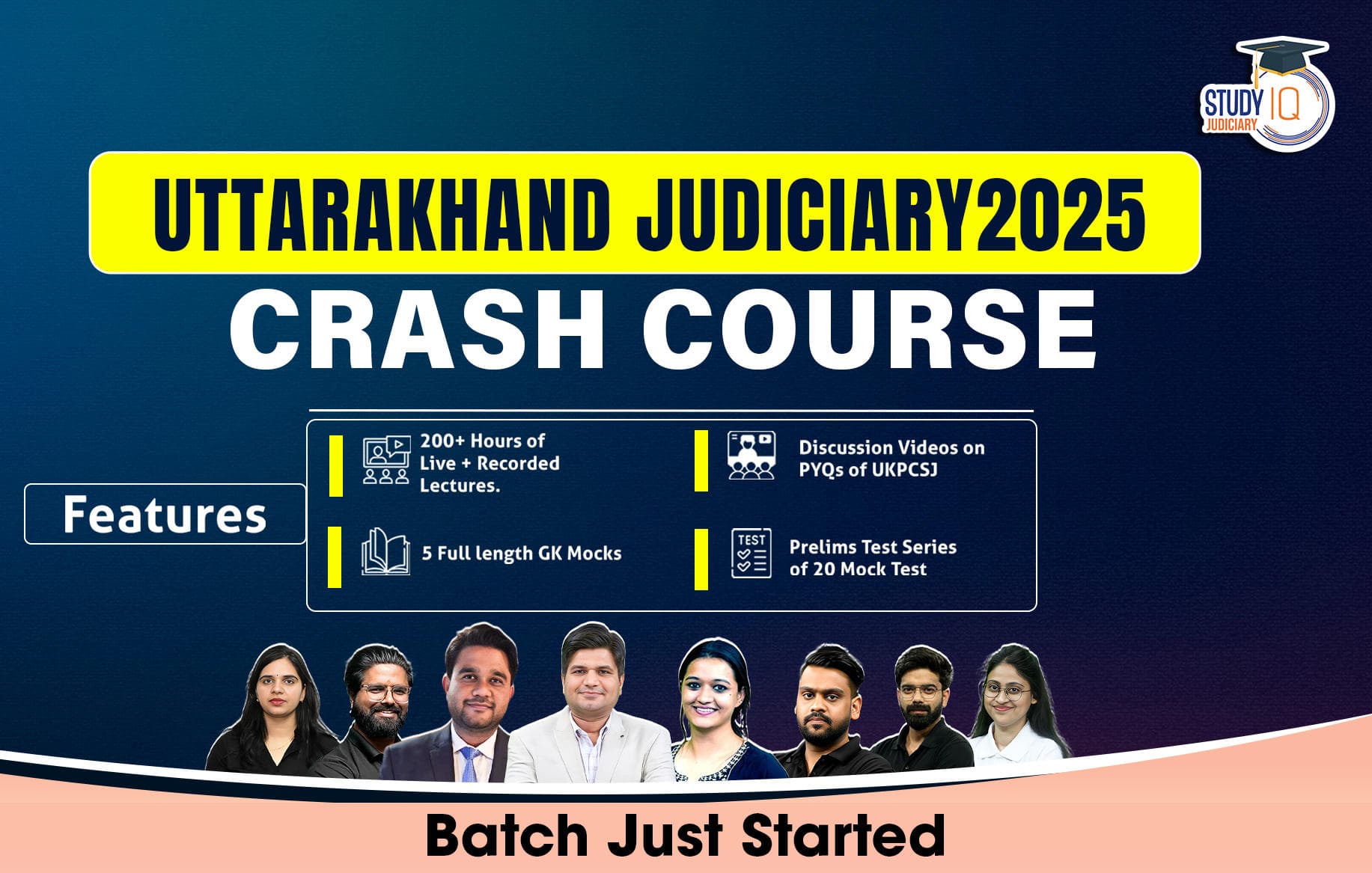Table of Contents
India’s parliamentary democracy, influenced by the Westminster model, is founded on the ideals of accountability, representation, and power equilibrium. The office of the Speaker of the Lok Sabha is widely recognized and extensively covered; however, the function of the Deputy Speaker is equally vital, yet frequently neglected. This essential constitutional office has remained vacant since 2019, prompting significant apprehensions over the integrity of democratic institutions and the adherence to constitutional conventions. Read this article to know the Importance of the Deputy Speaker in the Indian Constitution.
Importance of the Deputy Speaker in the Indian Constitution
Deputy Speaker is an important figure in the Indian Constitution, being the second most senior in the Lok Sabha after the Speaker. The Deputy Speaker is chosen by the members of the House and, in the absence of the Speaker, conducts parliamentary proceedings and sees to it that debates and legislative business are conducted smoothly. This is an important role in ensuring continuity and neutrality in the parliamentary process. The office represents India’s democratic ideals of fairness and balance in the country’s legislative system, as the Deputy Speaker should act impartially, usually ignoring party lines to ensure the integrity of the House.
1. Constitutional Foundation of the Deputy Speaker’s Office
1.1 Article 93: Mandate for Timely Election
- Article 93 of the Constitution of India stipulates:
- The House of the People shall, as soon as may be, elect two members to serve as Speaker and Deputy Speaker, respectively.
- This Article does not delineate a specific time frame; nonetheless, the expression “as soon as may be” has been construed by constitutional experts and jurists to signify that the election must occur within a reasonable timeframe.
- It signifies urgency and responsibility, rather than discretion or postponement.
- The ongoing practice of maintaining the office unoccupied for more than six years evidently contravenes the purpose of this Article, albeit not breaching the exact wording of the legislation.
1.2 Article 94: Continuity in Office
- Per Article 94, the Deputy Speaker remains in office until they:
- Submit resignation
- Are removed by a resolution of the House
- Cease to be a member of the House
- This underscores the idea of continuity in legislative leadership and guarantees that essential positions are consistently filled for the efficient operation of Parliament.
1.3 Article 180: Acting as the Speaker
- Article 180 authorizes the Deputy Speaker to execute the responsibilities of the Speaker under the following circumstances:
- The Speaker is absent.
- The position of Speaker is vacant.
- This provision is essential for preventing procedural paralysis, particularly in crises such as the resignation, death, or infirmity of the Speaker.
2. Functional Role: More Than a Substitute
2.1 Presiding Officer with Full Powers
- In the Speaker’s absence, the Deputy Speaker assumes identical authorities and responsibilities as the Speaker while presiding over the House.
- Upholding order and decorum
- Regulating debates and discussions
- Ensuring compliance with regulations and protocols
2.2 Chairing Committees
- The Deputy Speaker generally presides over significant parliamentary committees, including:
- Committee on Private Members’ Bills and Resolutions
- Designate Committees for legislative scrutiny
- Budget Committees and additional ad hoc committees
- These responsibilities are essential to democratic discourse, particularly as private members’ bills frequently tackle public issues that the government does not prioritize.
2.3 Neutral Arbiter
- The Deputy Speaker, akin to the Speaker, is expected to function as an impartial authority, transcending partisan politics. This impartiality is particularly advantageous during heated or sensitive debates or when members of the ruling party and opposition are in conflict.
3. Democratic Conventions and Political Traditions
3.1 Balancing Power with the Opposition
- In accordance with democratic principles, a longstanding parliamentary convention in India is to allocate the position of Deputy Speaker to the Opposition. This convention fulfills multiple objectives:
- Promoting bipartisanship
- Establishing trust and collaboration
- Amplifying the Opposition’s voice in legislative matters
- This tradition corresponds with traditions in the UK House of Commons and other Westminster-style democracies.
3.2 Convention vs. Law
- While not legally enforceable, constitutional conventions possess quasi-legal status and are deemed essential to the unwritten norms that uphold constitutional democracy.
- Disregarding such conventions can undermine democratic principles and promote executive supremacy.
4. The Prolonged Vacancy: A Democratic Deficit
- Since the commencement of the 17th Lok Sabha in 2019, the position of Deputy Speaker has remained vacant.
- Currently, the 18th Lok Sabha seems poised to maintain this pattern. This represents the most extended duration in India’s parliamentary history without a Deputy Speaker.
- According to Rule 8 of the Rules of Procedure and Conduct of Business in Lok Sabha (1952): The election of a Deputy Speaker shall occur on a date determined by the Speaker.
- This procedural rule grants the Speaker the power to commence the process. The ongoing postponement suggests either governmental meddling or institutional apathy, both of which undermine the rule of law.
5. Constitutional and Governance Implications
5.1 Centralisation of Power
- Given that the Speaker typically hails from the ruling party and the Deputy Speaker position is vacant, procedural authority is essentially centralised within the ruling establishment. This diminishes:
- The framework of checks and balances
- The Opposition’s involvement in procedural oversight
- The impartiality of legislative proceedings
5.2 Risk of Constitutional Crisis
- In situations where the Speaker is:
- Removed
- Resigns
- Becomes incapacitated
- The absence of a Deputy Speaker can lead to procedural paralysis. This was foreseen by the framers of the Constitution, who deliberately provided for an alternative in Article 180.
- A democracy flourishes through consensus-building and power-sharing. The decision to deny the appointment of a Deputy Speaker, particularly from the Opposition, exemplifies a winner-takes-all mentality that undermines democratic resilience.
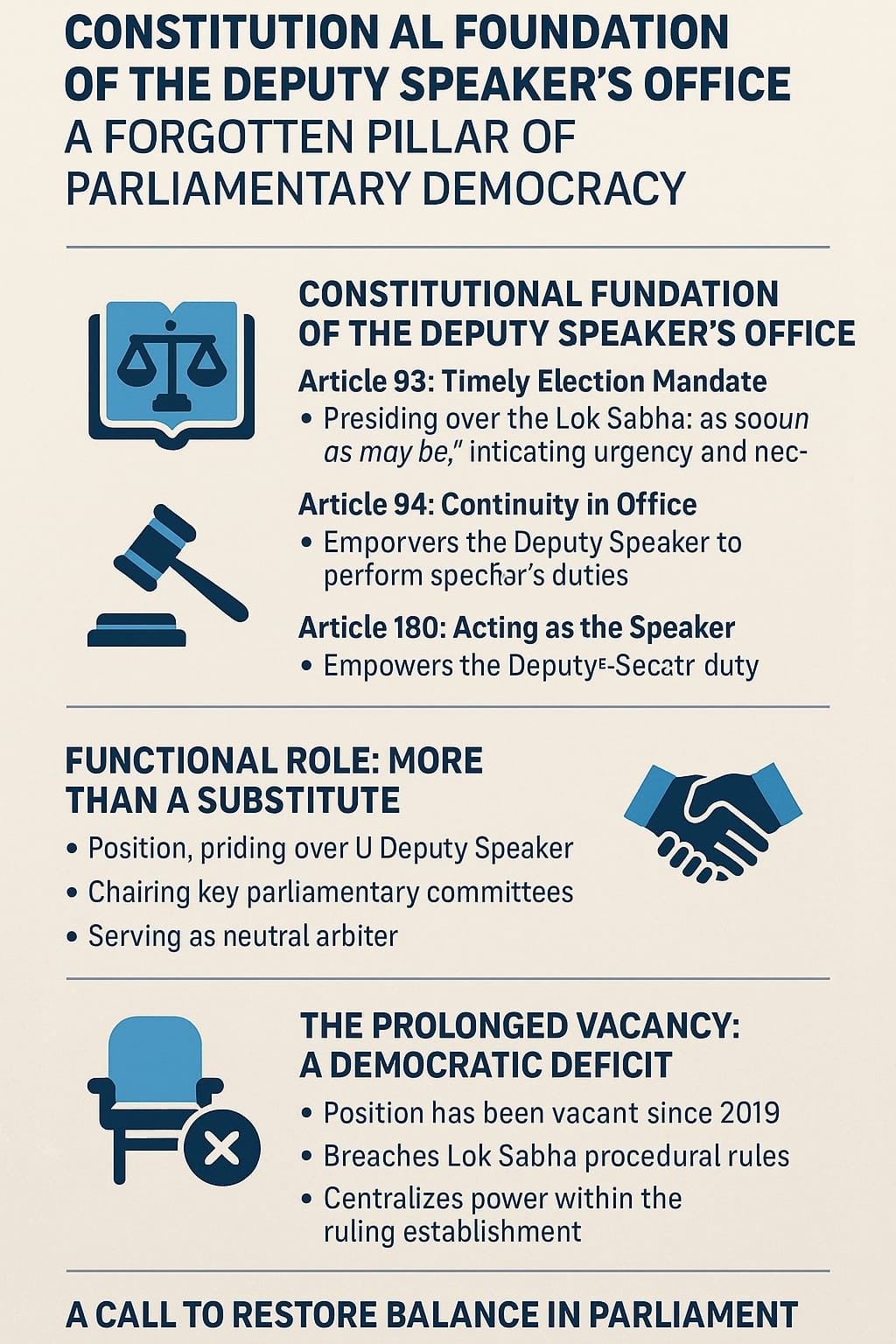
6. The Need for Institutional Reforms and Political Will
- To avert exploitation or delay of appointments, the subsequent changes may be contemplated:
- Amendment of Article 93 to provide a timeline (e.g., 60 days)
- Implementation of a binding resolution for time-sensitive appointments
- Systematization of constitutional conventions pertaining to the role of the Opposition
- The core of democracy transcends laws and resides in honouring the spirit of the Constitution. Constitutional morality necessitates that authorities maintain standards that safeguard minority opinions, ensure procedural equity, and promote inclusive government.
- The Deputy Speaker serves not merely as an office-holder; he or she embodies the custodian of the democratic process, a mediator of power, and a representation of inclusivity in governance. The persistent unoccupancy of this office:
- Contravenes constitutional purpose
- Undermines institutional safeguards
- Subverts the function of the Opposition
- Risks of instigating procedural and constitutional crises
- Reinstating the position—ideally with an Opposition member—would constitute a modest yet significant advancement in revitalising the principles of shared governance, debate, and collaboration that are fundamental to India’s democratic endeavour.

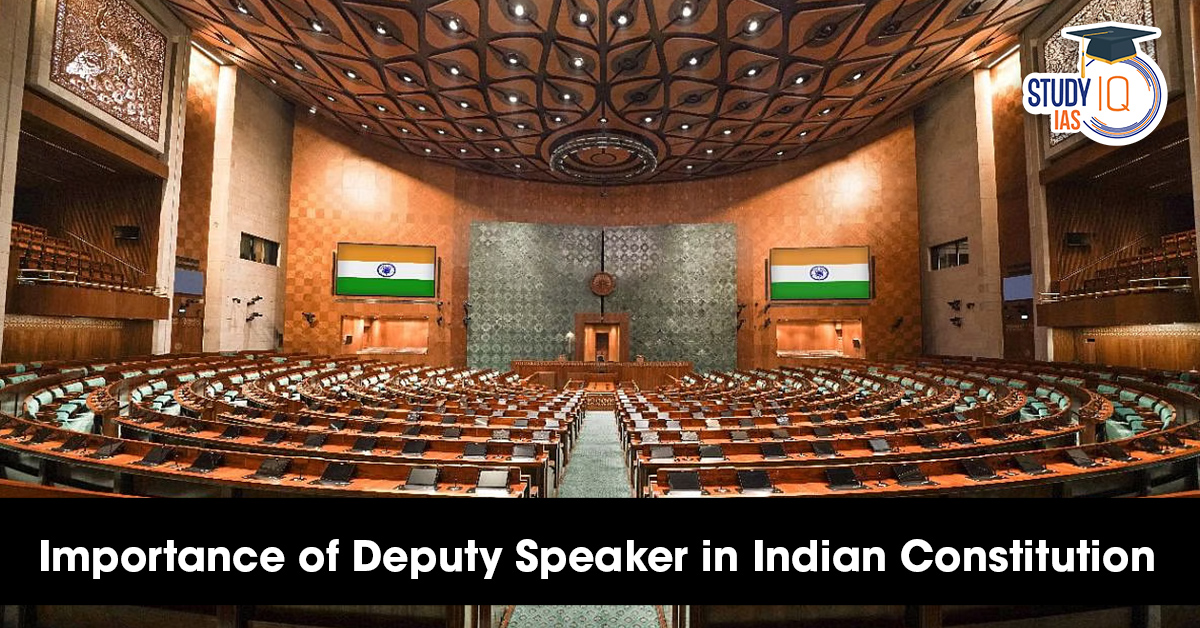
 Trial by Social Media: Public Shaming, D...
Trial by Social Media: Public Shaming, D...
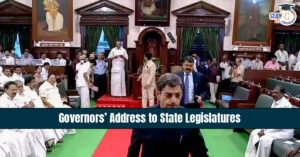 Governors’ Address to State Legislatur...
Governors’ Address to State Legislatur...
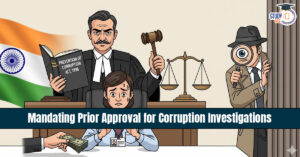 Mandating Prior Approval for Corruption ...
Mandating Prior Approval for Corruption ...






